#Ryan Grim
Explore tagged Tumblr posts
Text




(X) (X)
576 notes
·
View notes
Text

Remember ten days ago when Trump was almost assassinated?
What will the political landscape look like ten days from now?
Things are moving and moving fast.
youtube
Walter & Matt do the best breakdown of the last 24 or perhaps last 96 hours.
But as Matt wrote in his substack post today, "Who's Running the Country?"
WHO’S IN CHARGE? After Biden’s cryptic letter came out yesterday, a slew of elected Democrats, including rumored potential candidates like Gretchen Whitmer, Kentucky Governor Andy Beshear, Pennsylvania’s Josh Shapiro, California’s Gavin Newsom, and both Bill and Hillary Clinton, all swiftly endorsed Harris. Harris instantly had her own campaign site, suggesting significant lead time and planning. Even JoeBiden.com immediately became a mirror to the Harris site, while Biden’s Twitter face page was refashioned to feature a Harris 2024 banner. For all the world, it looked as if the party had unanimously decided to throw its weight behind Kamala, and well before the weekend, too. However, Barack Obama did not endorse Harris, nor did Chuck Schumer, Nancy Pelosi, or Cory Booker. We’re being told in numerous press accounts by more “people familiar with the matter” that this is all a mere formality, and the party leaders are “firmly” and ��without reservation” behind Kamala Harris. But are they? Some sources aren’t sure.
Although the top candidates seem to be publicly coalescing around Harris, I heard late last night this may be a temporary stance, held until the Democrats are sure Joe Biden’s $239 million war chest will transfer to Kamala’s hands without issue. The Republicans are preparing a legal challenge if Democrats attempt to pass on Biden’s cash, arguing the pair needed to be officially nominated before such a handoff could legally take place. “Biden can’t transfer his money to Harris because it was raised under his own name, and there is no legal mechanism,” said GOP lawyer Charlie Spies. Eugene Munin, a former General Counsel for the Chicago Transit Authority who’s worked on election law issues, said the status of the Biden funds represents a bit of a “gray area” legally. “I don’t think it’s definitive at all that she can just declare that she’s now a candidate for president and start spending that money as a candidate for president,” Munin says.
At least one Democratic consultant and several Republicans believe the fate of Harris is tied to two factors: how well the public responds to her in the next week or so, and whether or not the funds issue can be resolved quickly enough to allow her to begin aggressively advertising her candidacy. Despite the quick endorsements there have been signs of unease. Just this past Friday afternoon, Harris held a conference call for top donors to what was then still the Biden-Harris campaign. She showed up a half-hour late and said little except that they were going to win. “Everyone was pissed after the call,” one donor told the Washington Post, recalling the disastrous end of Harris’ 2020 run, also marked by internal frustrations about the future Vice President’s behavior (“I have never seen an organization treat its staff so poorly,” one Harris official wrote in a letter published by the New York Times). Rumors that have persisted since Biden’s own Hindenburg debate performance that top-level Democrats are less than thrilled with the prospect of a Harris run. The Times ran a long house editorial yesterday rejecting the idea of anointing Harris, hinting at electability issues and calling for a candidate to emerge from “process of public scrutiny” instead. Senior Democrats will watch to see how Kamala holds up under a few weeks of Internet fragging — millions are about to become introduced to the phrase “what can be, unburdened by what has been” — and then decide. How that decision is made, however, will tell us a lot about the question that matters more than anything right now: who’s America’s president right now? Obama? The Clintons? Politico’s “Why Biden Dropped Out”account claimed congressional leaders (“Chuck, Hakeem, Pelosi”) left the horse head in the president’s bed, while multiple Republican sources also pointed to Pelosi and Obama’s non-endorsements, reflecting a belief on the Trump side that the key to gauging Democratic strategy going forward will involve watching those two politicians. The only person we know for sure isn’t currently running things is Joe Biden.
youtube
But is Kamala about to get shanked in a week or two?
This is what the folks in my inbox don't seem to get.
As i noted earlier today, plenty of people behind closed doors don't think Kamala can win.
And it was less than a month ago that the Biden-Trump debate happened.
Things are moving fast folks.
Hold on to your seatbelts!

#my gif#2024: Year of the Wood Dragon#election 2024#democratic party#kamala harris#joe biden#matt taibbi#walter kirn#USA#politics#breaking points#krystal ball#ryan grim#barack obama#nancy pelosi#Youtube
9 notes
·
View notes
Text

News Article Here
On Friday morning, Rep. Ro Khanna (D-Calif.) will kick off a four-hour live stream from a Washington rooftop overlooking the White House with some of the biggest political Twitch and YouTube live-streamers. The creators include Clara Sorrenti, known online as Keffals; Steven Bonnell, known online as Destiny; and Ian Kochinski, known online as Vaush. The agenda says they will discuss issues such as climate change, affordable housing and student debt relief. But the significance of the event may be what it says about the way Democrats and Republicans are seeking to engage with potential voters online. “The new generation of Americans aren’t getting their news from MSNBC, CNN or Fox,” Khanna, who represents Silicon Valley in Congress, told The Washington Post. “That’s just not how millennials and Gen Z consume news or get inspired. One of the ways they’re making decisions is engaging with streamers. It’s the equivalent of talk radio or cable for the new generation.”[cont. on MSN]
Better than expected. Ro Khanna converse with Emma and Ian along with other popular YouTubers/streamers is something I never thought I'd see. I would love to see this sort of stuff continue; especially cause this gives insight to disaffected youths online, instead of the same politicians and talking heads beating around the bush in every topic and receiving light punches.
23 notes
·
View notes
Text
The New York Times instructed journalists covering Israel’s war on the Gaza Strip to restrict the use of the terms “genocide” and “ethnic cleansing” and to “avoid” using the phrase “occupied territory” when describing Palestinian land, according to a copy of an internal memo obtained by The Intercept. The memo also instructs reporters not to use the word Palestine “except in very rare cases” and to steer clear of the term “refugee camps” to describe areas of Gaza historically settled by displaced Palestinians expelled from other parts of Palestine during previous Israeli–Arab wars. The areas are recognized by the United Nations as refugee camps and house hundreds of thousands of registered refugees. The memo — written by Times standards editor Susan Wessling, international editor Philip Pan, and their deputies — “offers guidance about some terms and other issues we have grappled with since the start of the conflict in October.” While the document is presented as an outline for maintaining objective journalistic principles in reporting on the Gaza war, several Times staffers told The Intercept that some of its contents show evidence of the paper’s deference to Israeli narratives.
8 notes
·
View notes
Text
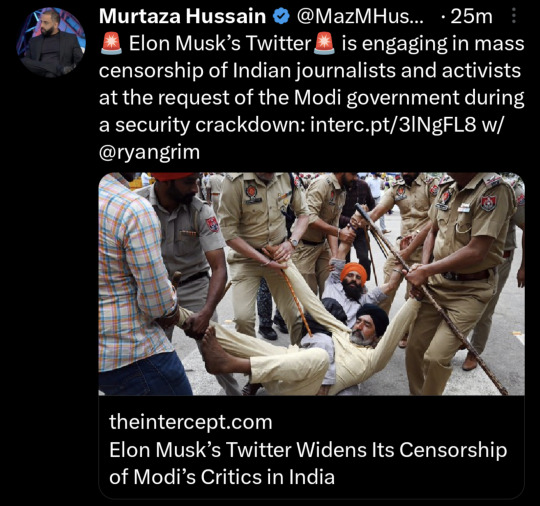
TWO MONTHS AFTER teaming up with the Indian government to censor a BBC documentary on human rights abuses by Prime Minister Narendra Modi, Twitter is yet again collaborating with India to impose an extraordinarily broad crackdown on speech.
Last week, the Indian government imposed an internet blackout across the northern state of Punjab, home to 30 million people, as it conducted a manhunt for a local Sikh nationalist leader, Amritpal Singh. The shutdown paralyzed internet and SMS communications in Punjab (some Indian users told The Intercept that the shutdown was targeted at mobile devices).
While Punjab police��detained hundreds of suspected followers of Singh, Twitter accounts from over 100 prominent politicians, activists, and journalists in India and abroad have been blocked in India at the request of the government.
#Twitter#Murtaza hussain#Elon musk#Indian#Modi#Ryan grim#The intercept#Censorship#Bbc#Prime minister#Punjab#Sikh#Amritpal singh#Sms#Government
31 notes
·
View notes
Text
8 Flagrant Ways The U.S-Backed Corrupt Caretaker Government In Pakistan Is Subverting The Election! Pakistan’s Corrupt $$$ Military-Backed Caretaker Government Has Gone To Extreme Lengths To Undermine The Opposition Party’s (PTI) Shot At The Polls.
— Ryan Grim | February 7, 2024 | The Intercept
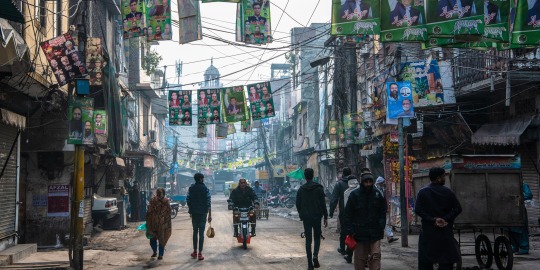
Pakistani residents walk under flags depicting candidates from different political parties ahead of the upcoming general election in Lahore, Pakistan, on Feb. 7, 2024. Photo: Rebecca Conway/Getty Images
As Pakistan Prepares to determine its next government in a general election on Thursday, concerns are intensifying about electoral irregularities. A growing body of evidence points to election manipulation and political interference by the Pakistani military.
Pakistan was supposed to go to polls last year. The country’s constitution has five-year terms for both the national and provincial assemblies as well as for the post of the prime minister. When the former Prime Minister Imran Khan’s government was toppled in a parliamentary coup backed by the Pakistani military and the U.S. State Department in 2022, it was only in its fourth year.
Since then, the Pakistani military has ruled from the shadows, trying to delay the inevitable elections while at the same time trying to ensure that the massively popular Khan and his party Pakistan Tehreek-e-Insaf, or PTI, do not come back to power.
Inside Pakistan, the media is completely muzzled. Outside Pakistan, the upcoming elections are being called the “least credible in the country’s historyOpens in a new tab,” and “more like a coronationOpens in a new tab,” where the military is understood merely to be choosing a new civilian face for its rule. While the U.S. State Department has consistently said that it has not made a determinationOpens in a new tab about the fairness of Pakistani elections, the events leading up to the elections have not gone unnoticed in Congress.
“Threats to free and fair elections anywhere [are] concerning. In light of recent events in Pakistan and the upcoming election, let’s be clear: promoting stability, democracy, and human rights around the globe is paramount to maintaining our values worldwide,” posted Republican Rep. Nathaniel MoranOpens in a new tab on Twitter.
“There can’t be free and fair elections when one of the opposition parties has been criminalized,” posted Democratic Rep. Ilhan OmarOpens in a new tab, echoing Moran’s sentiments from across the political aisle.
The publicly visible instances of election rigging — visible, that is, to all but the Biden administration — are too numerous to articulate in a single article. What follows are the most egregious.
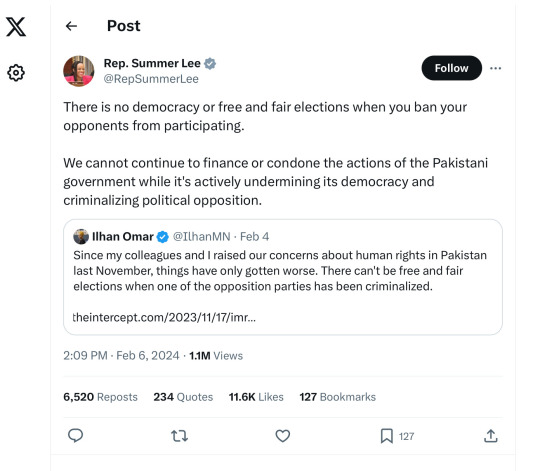
Banning the Leading Party’s Symbol
On a Pakistani ballot paper, each political party has an electoral symbol. Candidates in each of Pakistan’s hundreds of constituencies have their party symbols next to their names, a critical guide for the substantial portion of the electorate who can’t read. PTI candidates were stopped from using their unified electoral symbolOpens in a new tab — a cricket bat — by the court, based on a technicality no other party was subjected to. This means each PTI candidate is assigned a random symbol and has to run an individual campaign.
With the loss of its bat, PTI was converted from a formidable political party to a loose group of individuals with no legal affiliation overnight, effectively disenfranchising millions of citizens who placed their trust in PTI as a political entity. The move has been severely criticized as a “huge blow to fundamental rightsOpens in a new tab” by the Pakistani legal fraternity and civil society.
The implications of this go even further. If, by some miracle, PTI candidates overcome all the obstacles and win a majority in the Parliament, the technically unaffiliated candidates would be missing key legal protections and could be vulnerable to bribes and coercion by the military.
Shutting Down the Internet 🛜
The Pakistan Telecommunication Authority is now chaired by a retired generalOpens in a new tab. The chair of the PTA has the ability to shut down the whole country’s internet or specific websites on a moment’s notice. He has shut down social media and the internet every timeOpens in a new tab Khan’s PTI held an election-related event Opens in a new tabonline in the past few months, affecting more than 100 million users.
The Pakistani media has already expressed concernsOpens in a new tab that the internet might be shut down on election day to discourage people from voting. Lending credibility to those concerns, a top minister on Tuesday hinted at the possibility of an internet shutdown on election day, alarming human rights organizations including Amnesty International and prompting them to write an open letter and put out a statementOpens in a new tab.
“Amnesty International, along with several other human rights organizations, call on Pakistani authorities to guarantee uninterrupted access to the internet and digital communication platforms for everyone across the country,” the statement read.
Banning and Jailing the Leading Candidate
The charges against ousted prime minister Khan range from incoherent to absurd. He was charged with “exposing state secrets” for publicly discussing the contents of the secret cable that The Intercept reported on last year. He was slapped with a seven-year sentence for what the Supreme Court said was an invalid marriage. And he got 14 years for supposedly keeping state gifts without filing the proper paperwork or compensating the state, though all evidence suggests that he did so.
Three major court decisions in quick succession just before the elections has been seen inside Pakistan as a message from the Pakistani military establishment. The message is intended not only for the voters, but also for the candidates, signaling the influence and control wielded by the military.
Hacking the Election Management System
Just two days ago, a local electoral official complained in a letter circulated to the Election Commission of Pakistan that key software used in managing elections was behaving oddly. In the letter, the official cites specific issues with the software and claims that data related to its staff was erased. “This weakness of [the] system has created many issues and also raises [a] question mark on the reliability and validity of the tool/software. This shows that either the [election management system] is [an] utter failure or there is a someone else [sic] that controls and manages the system behind the veil,” he wrote in the document leaked onlineOpens in a new tab.
The election management system was built by the National Database and Registration Authority, a government department that is usually headed by a civilian but since last year has been run by a generalOpens in a new tab in the military. NADRA is the primary custodian of all of Pakistan’s data — from population and demographic data to voter rolls — and is supposed to play a key role in conducting elections along with the Election Commission of Pakistan. As long as the Pakistani military has direct control of NADRA, it controls all the systems used to administer elections and transmit their results.
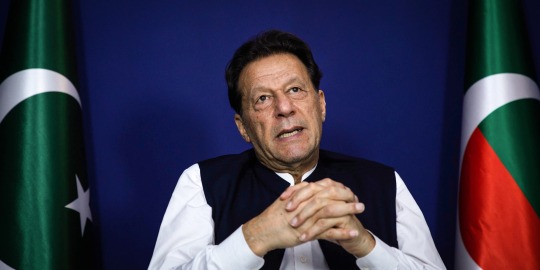
Secret Pakistan Document Undermines Espionage Case Against Imran Khan! The former prime minister is charged with compromising Pakistan’s secret communications, but a document leaked to The Intercept says that didn’t happen. Ryan Grim, Murtaza Hussain, December 18 2023. Imran Khan, Pakistan’s former prime minister, during an interview in Lahore, Pakistan, on June 2, 2023. Photo: Betsy Joles/Bloomberg via Getty Images
Terrorist Violence
Last week, 10 PTI activists were killedOpens in a new tab in a bomb blast at an election rally in the Balochistan province. The same week, a PTI candidateOpens in a new tab and a senior leaderOpens in a new tab were shot dead in the Khyber Pakhtunkhwa province in separate incidents. In Karachi, a PTI candidate’s car was shot at. According to a statement from the United Nations high commissioner for human rights, there have been “no less than 24 reported instances” this year in which armed groups have attacked political parties in Pakistan ahead of the elections.
At least one of these deadly attacks was claimed by ISKPOpens in a new tab, the Afghan chapter of the Islamic State, which has never specifically targeted the PTI in the past.
Police Raids
When the elections were announced, there were several reports that unknown people and masked government officials were snatching the nomination papersOpens in a new tab of PTI candidates as soon as they would go to file them, thereby preventing them from filing to run before the deadline. Of the candidates who did manage to file, those who were not arrested faced frequent police raids on their homes.
During one raid at a political candidate’s home, an American police officerOpens in a new tab who happened to be vacationing in Pakistan was also arrested. He was subsequently released following intervention by the U.S. Embassy. In another police raid on a political activist’s house, the activist’s father suffered a heart attackOpens in a new tab and died.
Virtually every notable PTI member’s house has been raided and ransackedOpens in a new tab. In addition, PTI rallies and meetings have also been violently shut downOpens in a new tab by the police and scores of workers have been arrested. In one constituency in northern Pakistan, there were reports of police shootingOpens in a new tab at a PTI rally. On Tuesday, the last day of campaigning, almost everyOpens in a new tab PTI rally was attacked by police. In a video that went viral on social media, a PTI candidate, Zartaj Gul Wazir, is seen sitting on the road, cryingOpens in a new tab, after a police attack on her rally. In other areas that have not been so violent, comical social media videosOpens in a new tab of police chasing PTI activists through the streets have emerged.
In PTI strongholds, there are even reports of police ticketing people in unusually high numbers and confiscating their identification cards, which won’t be returned until after the election, meaning that they will be unable to vote.

Abducting Candidates and Their Families
There are reports of PTI candidates being abducted by unknown men and returning home only after announcing their withdrawal from the race. Most notably, a female PTI candidate, Iffat Tahira Soomro, was abducted and forced to step downOpens in a new tab under duress. She was the second candidate in the constituency to step down. PTI has now pitched a third candidateOpens in a new tab for the same seat.
In another incident, a PTI candidate’s elderly father was picked up from his house to pressure him into leaving the party. After four days, the father died in police custodyOpens in a new tab.
The U.N. Commission on Human Rights deplored these incidents in their statement on Tuesday. “We are disturbed by the pattern of harassment, arrests and prolonged detentions of leaders of the Pakistan Tehreek e Insaf (PTI) party and their supporters which has continued during the election period,” the statement read.
Voter Suppression
PTI has been counting on high voter turnout to counter the efforts to manipulate the elections. But by reducing the number of polling stations in key constituencies, the government is effectively suppressing votes in those areas.
There are polling stations that used to have a few thousand voters assigned to them but will now have tens of thousands of voters. One polling station in Lahore that used to have only 8,000 constituents has ballooned to 29,000Opens in a new tab, including thousands of young and first-time voters from all over Lahore. In some constituencies in Karachi, so many people have been assigned to each polling station that with a 50 percent turnout (roughly the total turnout for the last election), each voter will get only one minute and 13 secondsOpens in a new tab to vote.
Can PTI Still Win?
Despite the gloomy verdict, a sense of hope persists among many in Pakistan. Nothing illustrates this contradiction more than two women, Yasmin Rashid and Aliya Hamza Malik, who are contesting elections from jail. These two political prisoners, running their campaigns from incarceration and against all odds, have become symbolic figures representing resistance against military interference in Pakistani democracy.
“The Brazen Electoral Rigging, Persecution Of Political Leaders, And Sham Court Trials Have Substantially Increased The Stakes.”
“The election in Pakistan is going to be a referendum against the establishment – a local euphemism for Pakistan Army – and its associated partners,” says Hussain Nadim, an analyst and former policy specialist working with the Pakistani government. “This is why despite all efforts by the establishment otherwise, we can forecast a historic turnout in the elections. The brazen electoral rigging, persecution of political leaders, and sham court trials have substantially increased the stakes,” he added.
In the week leading up to the elections, Khan has been sentenced to a cumulativeOpens in a new tab 31 yearsOpens in a new tab in prison. His political party confronts the imminent risk of outright prohibition, with his motley crew of candidates on the run, evading authorities, attempting to canvass for votes clandestinelyOpens in a new tab (and even using Opens in a new tabartificial intelligence).
Yet, PTI has resisted calls to boycott the election. The goal, they say, is to win in such dramatic and runaway fashion that even all of the above can’t steal it.
#The Intercept#Ryan Grim#Pakistan’s Elections#Corrupt Pakistan’s $$$Army General#Corrupt to their Cores Politicians | Judges#Under Pressure from Pakistan’s $$$ Army Generals Illegal Caretaker Government#Imran Khan#PTI’s Independent Candidates
3 notes
·
View notes
Text
Note from Wikipedia's about section on Ryan Grim:
Ryan W. Grim is an American author and journalist. Grim was Washington, D.C. bureau chief for HuffPost and is the Washington, D.C. bureau chief for The Intercept.
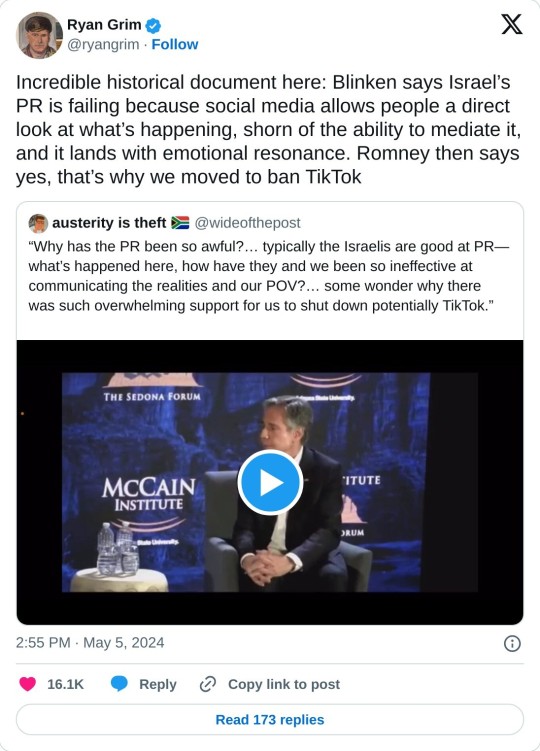
3K notes
·
View notes
Text
youtube
Matt Walsh DESTROYS WOKE Host On His Own Show
This video features a debate between Matt Walsh and Ryan Grim on systemic racism. They discuss when racism stopped being systemic, the impact of historical laws and policies on Black Americans, segregation in schools and neighborhoods, mortgage interest rates discrimination, implicit bias, and class-based assumptions in the banking system. Matt Walsh argues that the focus should be on class rather than race, while Ryan Grim emphasizes the continued systemic issues faced by Black Americans. The discussion touches on the complexity of systemic racism, classism, and the influence of historical factors on the current societal landscape. At the end, the debate concludes with some disagreements on the root causes of discrimination and systemic inequalities faced by minorities.
0 notes
Text
I was excited to check out Ryan Grim’s newest book The Squad: AOC and the Hope of a Political Revolution. As a person on the left, the last 5-10 years have been the most hopeful in my lifetime, so I was interested in reading something about progressives in the American congress.
Boy, this book was depressing at times.
It was nice to see that progress is being made at the electoral level. Not enough, obviously, but there is some. Still, my god, the pushback from Democratic leadership in the House under Nancy Pelosi against nearly everything that Congresspeople like Alexandria Ocasio-Cortez, Cori Bush, Ilhan Omar, Ayanna Pressley, Rashida Tlaib, and Jamaal Bowman (among others) proposed is infuriating.
It is nice to know that it sounds like there is a better relationship between “the Squad” and the leadership team of Hakeem Jeffries, but Pelosi’s hatred at least seems to be out of power.
One of my big takeaways early from this book is that Nancy Pelosi’s so Russia-pilled that her brain is partially leaking out of her head. In her first sit down meeting/lunch with AOC, Pelosi spent nearly an entire hour ranting about how she thought the “Abolish ICE” protests were “Russia’s plan”. Sure thing, Nancy!
The other major takeaway for me in this book is that the various progressive groups — from abortion rights to environmentalists to voting rights to healthcare groups — melted down from internal squabbles just when they needed to form a unified block to deal with Joe Biden’s inauguration.
I think Grim did a good job at setting where the progressive movement was at an electoral place from the 2016 US Presidential election through the 2022 Midterms. The book does a great job of picking the major event of the time and giving you the background of things from various progressive perspectives.
#book review#books#ryan grim#alexandria ocasio cortez#cori bush#ilhan omar#jamal bowman#politics#rashida tlaib#the squad
0 notes
Text

From Ryan Grim at The Intercept
1 note
·
View note
Text


50 notes
·
View notes
Text

Well, well, well...
The debate that needed to happen, happened.
youtube
Can't pretend we all don't know now.
EXCEPT for this guy:

It was literally a debate that changed history, but the 44th POTUS is doing this:

Straight up gaslighting from Barack Obama about the situation that he caused.
Everyone else has known for a LOOOOONG time.

Here are some tweets from the land of sanity:

[link]

[link]

[link]

[link]

[link]

[link]
And if you think Kamala is going to save you, well, most people don't think she could win a presidential election.
youtube
Can't wait until SCOTUS enters the fray with their last day of their current term ending tomorrow...

[link]

[link]
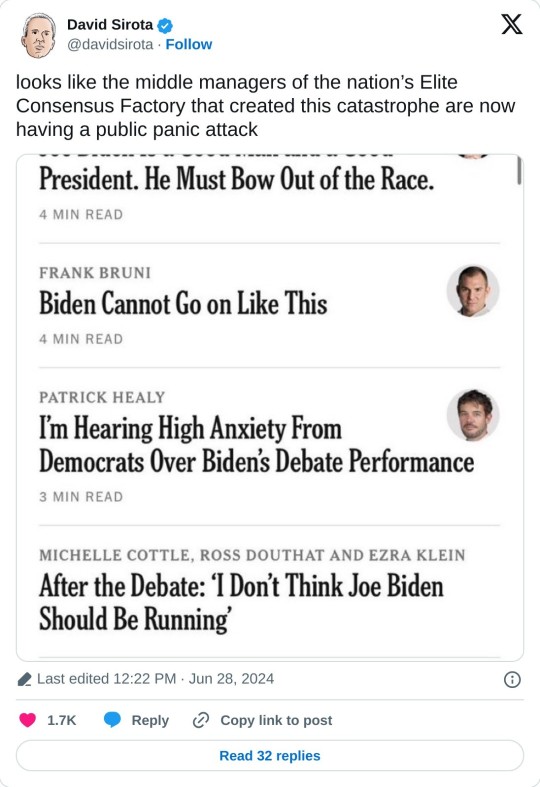
[link]

[link]

[link]

[link]

[link]

[link]

"There are decades where nothing happens, and then there are weeks where decades happen." ~ Vladimir Lenin
#2024: Year of the Wood Dragon#USA#election 2024#politics#democratic party#democrats#republicans#GOP#joe biden#donald trump#barack obama#twitter#well well well#well there's your problem#my gif#Matt Stoller#breaking points#saagar enjeti#krystal ball#ryan grim#kamala harris#SCOTUS#david sirota#magazines#media#critique#bernie sanders#25th amendment#shade#Youtube
14 notes
·
View notes
Text
you are not entitled to doordash in the luxury space communism future actually
82 notes
·
View notes
Text
youtube
That's right, me and Diamanda Hagan are back together, and this time we're going deep underground to meet an evil cave troll in Grim!
Oh, and a wild Ryan Hollinger might have something to do with it.
17 notes
·
View notes
Text
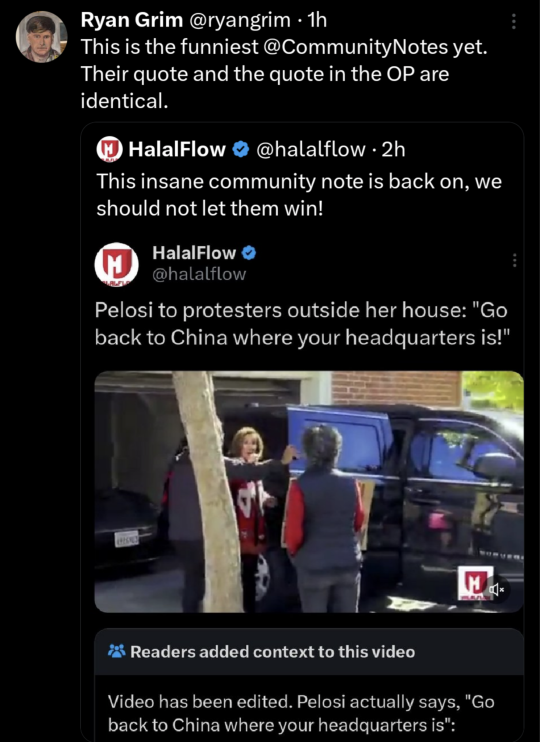
X
0 notes